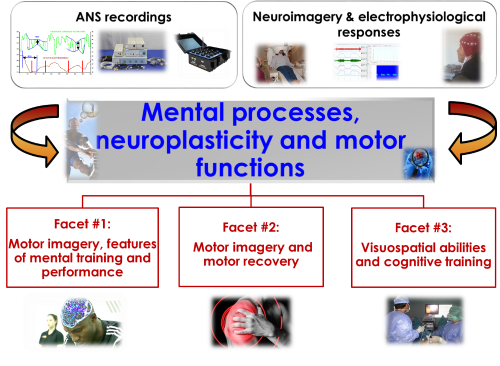MP3 project
General design of the scientific project of the MP3 team
Facet #1
SMILES: This project is designed to investigate the contribution of sleep to motor consolidation after motor imagery learning of sequential movements in young and old populations. Electrophysiological correlates of mental practice will be collected during motor imagery training as well as during a night of sleep, in order to understand in greater details brain modulations during motor consolidation. We expect that motor consolidation will be selectively altered in the elderly population, most especially for fine motor skills. This project may not only add knowledge in the fields of neuroscience of aging, motor learning and sleep, but also promote therapeutic applications in persons with motor disorders. The project will be performed in collaboration with the laboratory ‘Sleep, Cognition and Consciouness’ of Salzburg University.
Mental load and Motor imagery: The aim is to objectivate, through psychometric and neurophysiological correlates, the mental load induced by the repetitive practice of motor imagery, as well as its effects on the quality of the mental work. The main hypotheses are the following: i) mental fatigue increases along with motor imagery practice, ii) motor imagery quality and vividness decrease along practice, and iii) there is a negative correlation between mental fatigue and motor imagery vividness/quality. Beyond a given fatigue threshold, neurophysiological peripheral correlates of motor imagery should become undetectable. The extension of this work should allow us to explore and objectivate the implications of effective motor imagery in enhancing motor performance. This work will be performed in close collaboration with the PAF team.
Stress and cognitive functions: This project will focus on three main axes. A first purpose is to characterize the possible cumulative effects of motor imagery, biofeedback and cognitive stimulation (tDCS) on stress. A challenge will be to determine the optimal conditions limiting the deterioration of cognitive processes following acute stress. A second aim, through a collaboration with the CLESS (Centre Lyonnais d'Enseignement par la Simulation en Santé), is to evaluate the benefits of biofeedback on stress and ecological immersion performance of medicine students in a high-fidelity health-care simulation scenario. Through monitoring physiological markers of stress and neuroimaging techniques, a third objective will be to determine the efficacy of prolonged remediation treatment to chronic stress (6 weeks) in a population at risk (medicine students, moderately or highly stressed).
Fatigue, mental training and recovery: this is one of the three structural projetcs of the laboratory, including a collaboration with SPIP and PAF teams. The aim is to understand in greater details the interactions and relationships between fatigue processes, mental training based on motor imagery, and recovery during or after effort (see below).
Facet #2
Motor imagery and developmental coordination disorders: the first objective is to explore the efficacy of performing motor imagery to improve both motor and cognitive capacities (motor inhibition, motor imagery ability, motor programming) in children suffering from developmental coordination disorders (8-12 years). From a theoretical perspective, this project will also contribute to determine, for the first time, the cerebral correlates of the motor imagery deficit in children with developmental coordination disorders. This project will be performed in collaboration with Saint Joseph University (Beirut, Lebanon), through a PhD co-supervision.
Motor imagery and post-traumatic recovery: the objective is to pursue the exploratory work initiated during the previous contract, looking at the therapeutic effects of motor imagery following knee injury. The current challenge is to determine the optimal conditions of imagery use, and how to adequately integrate imagery in the course of physical therapy to improve motor and functional recovery. The selective additional effect resulting from the combination between mental training and tendon vibration will be examined in collaboration with the PAF and SPIP teams.
Facet #3
An@tomy2020: This project aims to develop an innovative educational tool designed to enhance functional anatomy learning, based on the principle that movements are likely to promote the memory of knowledge. The project requires the design of an animation of an anatomically realistic model of the learner from a capture of his or her movements, the knowledge related to these actions, and the implementation of new modes of interaction to develop visuospatial ability. The project is structured along three scientific lines. The first one is related to the capture of movements and the transfer and animation of an anatomical model surimposed on the learner’s body. The second one is the development of precise and effective interaction techniques in augmented reality. Evaluations will be designed to highlight the impact of these modes of interaction on memory. The third axis concerns the definition of pedagogical content and the quantification of how it contributes to facilitate the learning process. The developed platform will be tested on medicine and kinesiology students as a first step before its integration into the respective cursus at the university.
ANTEPULSIO: The objective of this project is to develop and commercialize a multimedia digital tool for patients and students to provide a greater understanding of human functional anatomy. Its originality is the presentation of anatomy via a numerical model presenting a realistic physical behaviour, combining simulation techniques and real-time 3D technology. Anatomy education is at the heart of the project, resulting from several years of market study and user needs in health education area. This project therefore aims to develop a novel 3D digital model of the human musculoskeletal system that can be manipulated in real-time, and further directly adapted to pedagogy. Basically, two products will be developed:
- ANTEPULSIO Coaching, an interactive tool for health professionals, designed to illustrate using 3D technology the pathologies or traumas of patients.
- ANTEPULSIO Students, a serious game promoting the learning of human functional anatomy, designed for teachers and students in the fields of health sciences, medicine and kinesiology.



